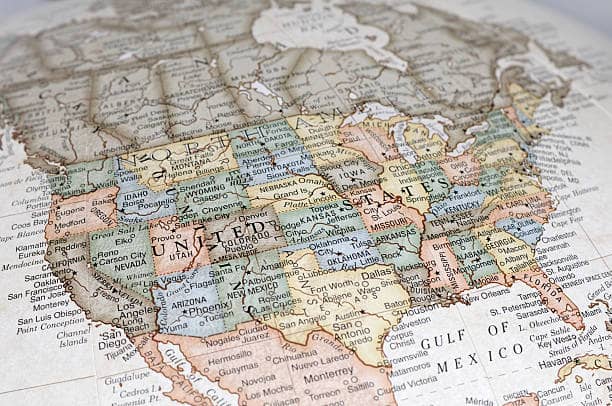Table of Contents
Last year was a big one for sports betting—the biggest ever in fact for the United States as Americans wagered nearly $57 billion, according to the American Gaming Association, the commercial casino industry’s top lobbying group.
Whether gamblers traded their dollars for physical betting slips inside traditional sportsbooks that line the Las Vegas Strip or placed their wagers on smartphones while walking down Fifth Avenue in New York City—people all over the country cashed in on the action.
And for those poor degenerate souls standing on the outside—both gamblers and individual states who currently do not have legalized betting—they are anxiously waiting to get skin in the multi-billion-dollar sports betting sphere.
Is Sports Betting Legal Anywhere?
No, it is legalized and regulated by individual states, not the federal government. Each state has different legislative processes and timetables for regulating sports betting.
From 1992 until 2018, the Professional and Amateur Sports Protection Act prohibited states (except for Nevada) from legalizing single-game betting on professional and college sports.
But a U.S. Supreme Court ruling overturned PASPA, and more than half of the U.S. has since legalized sports betting—with many others planning to join in the next few years. However, some states likely will never have sports betting, just as they do not allow the lottery.
Legal Sportsbook Near Me
This is a common question, and the answer depends on where you live.
Eleven of America’s 15 most-populated cities don’t have retail sportsbooks. If you live in New York City, for instance, your closest option would be traveling to the FanDuel Sportsbook at the Meadowlands Racetrack in East Rutherford, N.J. But since legislation was enacted in January 2021, New Yorkers can get their sports betting fix on phones and computers.
Residents of Los Angeles, Houston, San Antonio, San Diego, Dallas, San Jose, Austin, Jacksonville, Fort Worth and Columbus are currently unable to bet. California and Texas have not passed sports betting legislation, while Ohio has a launch pending for early 2023. Florida is in a legal limbo that halted its online sports betting last year.
Technically, Chicago doesn’t have a retail book within its city limits (DraftKings will operate a retail sportsbook at Wrigley Field soon), but a handful of brick-and-mortar locations are within an hour’s drive of the Windy City.
Phoenix has two physical locations: FanDuel Sportsbook partnered with the Phoenix Suns for a location at the Footprint Center downtown, and Caesars Sportsbook partnered with the Arizona Diamondbacks for a spot at Chase Field.
Few sports fans are as passionate about their teams as Philadelphians, and bettors in or around the “City of Brotherly Love” have half a dozen options to pick from to pluck down green on their Eagles, Phillies, 76ers and Flyers.
How Many States Have Legal Sports Betting?
Currently, 30 states and Washington D.C. have legalized betting in some form, either retail—in-person outlets (think Las Vegas sportsbooks)—or fashion, online (mobile apps).
Retail-Only Betting States
- Delaware
- Maryland
- Mississippi
- Montana
- New Mexico
- North Carolina
- North Dakota
- South Dakota
- Washington
- Wisconsin
Retail-Plus-Online States
- Arizona
- Arkansas
- Colorado
- Connecticut
- Illinois
- Indiana
- Iowa
- Louisiana
- Michigan
- Nevada
- New Hampshire
- New Jersey
- New York
- Oregon
- Pennsylvania
- Rhode Island
- Virginia
- Washington D.C.
- West Virginia
Online-Only Sports Betting States
- Tennessee
- Wyoming
States Where Sports Betting is Pending
- Kansas
- Florida
- Maine
- Massachusetts
- Nebraska
- Ohio
States Where Sports Betting Isn’t Legal (Yet)
- Alabama
- Alaska
- California
- Georgia
- Hawaii
- Idaho
- Kentucky
- Minnesota
- Missouri
- Oklahoma
- South Carolina
- Texas
- Utah
- Vermont
DraftKings Sportsbook States
The company that revolutionized daily fantasy sports (DFS) has also become omnipresent in the sports betting atmosphere in America. DraftKings operates in 17 states—Arizona, Colorado, Connecticut, Illinois, Indiana, Iowa, Michigan, Mississippi, New Hampshire, New Jersey, New York, Oregon, Pennsylvania, Tennessee, Virginia, West Virginia and Wyoming—via mobile and/or retail outlets.
Undoubtedly, DraftKings—which also operates a sportsbook in Ontario, Canada’s most populous province—has its sights set on further expansion as more states continue legalizing sports betting.
DraftKings CEO Jason Robins recently lobbied to get California voters to support a measure in fall 2022; and in 2021 the Boston-based company partnered with the Dallas Cowboys, Houston Astros, San Antonio Spurs and several other Texas professional sports organizations as part of a so-called Sports Betting Alliance to lobby for a bill in the Lone Star State.
FanDuel Sportsbook States
In much the same fashion as its main rival DraftKings, FanDuel made its namesake in daily fantasy sports before transitioning into sports betting and online casino games. The New York-based company currently operates in 15 states—Arizona, Colorado, Connecticut, Illinois, Indiana, Iowa, Louisiana, Michigan, New Jersey, New York, Pennsylvania, Tennessee, Virginia, West Virginia and Wyoming—via mobile and/or retail outlets.
FanDuel—under parent company Flutter Entertainment, the world’s largest sports betting entity—has no plans to slow down. FanDuel made its debut in Ontario, Canada in April 2022 and recently partnered with television network The Sports Network (TSN), the official broadcast partner of the NFL in Canada.
FanDuel’s continued evolution into a sports media company also includes a 24-hour “watch and wager” network that looks likely to launch by the end of the summer or fall in time for the upcoming NFL season.
Frequently Asked Questions About Legal Sports Betting
Is Sports Betting Legal in California?
Currently, sports betting in America’s most populous state is illegal. But that could all change soon, possibly as early as 2023, as multiple ballot proposals go to vote in the November 2022 election. If legislation passes, the Golden State could witness a monetary explosion mimicking the Gold Rush days of the mid-1800s, with billions changing hands.
Is Sports Betting Legal in Florida?
At time of writing, betting in Florida is in legal limbo as lawsuits halted mobile sports wagers after a three-week run in 2021. A federal judge struck down a compact between the Seminole Tribe and the state.
Despite an aggressive push by several major sportsbook operators—including DraftKings and FanDuel, who already operate daily fantasy sports in the Sunshine State—to intervene and pass new legislation, legal proceedings will not move forward until at least 2023.
Is Sports Betting Legal in Ohio?
Technically yes, but the reality is nobody in the Buckeye State can throw down bets just yet on the Browns, Bengals, Reds, Guardians, Cavs or their favorite home team—Ohio State.
A sports betting bill was passed in December 2021, but the Ohio Casino Control Commission is still putting the finishing touches on regulations before gambling begins on January 1, 2023. With more than two dozen companies applying for licenses, there should be many ways for bettors in the seventh-most populous state to get in on the action.
Is Sports Betting Legal in Texas?
They say everything is bigger in Texas. Well, everything except for sports betting, which is nonexistent—at least for the moment.
Despite the Lone Star State’s large geography, equally excessive population and grandiose entertainment options, Texas hasn’t figured out a way to pass a sports betting bill yet.
After stalling out in the 2021 legislative session, despite an alliance by professional sporting organizations—including the Dallas Cowboys, Dallas Mavericks, Dallas Stars, Houston Astros, Houston Rockets, Houston Texans, San Antonio Spurs and Texas Rangers—any chance for football-crazed bettors to get in on the gridiron action will have to wait until 2023, as the Texas legislative session only occurs biennially.
Is Sports Betting Legal in Canada?
Canada has had legal sports betting since 1985, but not until the past two years has the industry operated in much the same fashion as Las Vegas-style betting—meaning bettors can place wagers on single-game events. Before the amendment of its gambling law in August 2021, Canadians could only bet sports as a parlay option made through provincial lotteries.
But with the newly passed legislation, Canada, like the U.S., has allowed each province to regulate sports gambling within its own territory. Ontario wasted little time becoming the country’s foremost leader in the space, welcoming several large commercial sportsbook operators in April 2022. Many prominent bookmaking companies—TheScore Bet, PointsBet, BetMGM, FanDuel, DraftKings, Caesars, BetRivers and Bet365—have their brick-and-mortar and digital footprints firmly embedded in the Great White North.
With Ontario, Canada’s most-populated province, leading the charge with many sportsbook operators and mobile betting options, it’s just a matter of time before Canada’s other nine provinces catch up and cash in on this billion-dollar-plus bonanza.
Can I Start My Own Sportsbook?
No, unless you have deep pockets. In addition to the initial high-priced costs of building a physical or online sportsbook, a person would have to go through an extensive process of obtaining gaming licenses, fees, etc., in whatever state they plan on operating in.
State laws typically cap the number of licensed sportsbook operators, leaving permits for only the industry’s largest and most powerful players.
Are Bookies Illegal?
When people think of bookies (an abbreviated term for a bookmaker—or anyone who facilitates gambling by setting odds, placing bets and paying out winning wagers or collecting losing ones), they generally think of a seedy mob character in a movie threatening to get their money by any means necessary.
That depiction was probably pretty accurate up until the last two decades, but the introduction of online sports betting has changed the landscape for bookies.
While unlicensed bookmaking is illegal almost everywhere in the U.S. (with felony charges, hefty fines and significant jail time possible), Florida allows a very watered-down version of it. However, with several stipulations that make it impossible to make any legal profits, becoming a bookie in the Sunshine State is a non-starter.


